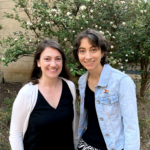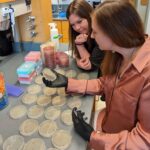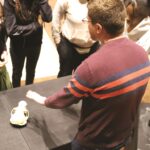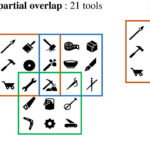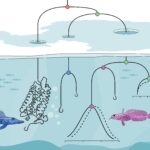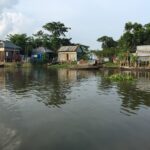featured
How do interactions between individuals from different populations contribute to cultural richness?
May. 3, 2023—By: Yotam Ben-Oren (The Hebrew University of Jerusalem), Erella Hovers (The Hebrew University of Jerusalem), and Oren Kolodny (The Hebrew University of Jerusalem), Nicole Creanza Assistant Professor of Biological Sciences (VU) Why are human cultures so diverse? What makes some cultures richer than others? How can very small populations possess very complex cultures? According to...
Paleontology Graduate Student Uncovers Lessons from Microfossils of the Grand Canyon
Apr. 7, 2023—By Dr. Andy Flick Evolutionary Studies scientific coordinator Kelly Tingle, graduate student in Simon Darroch’s lab (Earth and Environmental Sciences), just published a new first-authored article outlining some exciting discoveries related to microfossils found in the Grand Canyon. Vase-shaped microfossils were amoebae that exist worldwide and can provide some insight into early life on Earth....
Trio of Vanderbilt Researchers Identify Variable Outcomes in Experimental Evolution
Apr. 7, 2023—By Dr. Andy Flick Evolutionary Studies scientific coordinator Sarah Worthan a postdoctoral researcher led a new effort with undergraduate researcher Robert McCarthy and their advisor, assistant professor of biological sciences Megan Behringer, to understand the effects of the environment on the outcome of experimental evolution studies. The article, “Case Studies in the Assessment of Microbial...
International Collaboration Uncovers Evolutionary History of Respiratory Virus in Argentina
Mar. 20, 2023—By Andy Flick Evolutionary Studies scientific coordinator Stephanie Goya, who did a rotation with the lab of Suman Das, recently published a paper with the lab about the evolution of respiratory syncytial virus in a population of humans in Buenos Aires, Argentina. The paper, “Evolutionary dynamics of respiratory syncytial virus in Buenos Aires: Viral diversity,...
Vanderbilt Researchers find Evidence for Evolutionary Constraints on Immunity
Mar. 18, 2023—By Dr. Andy Flick, Evolutionary Studies scientific coordinator A new study led by members of Ann Tate’s (Assistant Professor of Biological Sciences) lab found evidence that pleiotropy may slow down evolution of genes involved in immunity. Alissa Williams, postdoctoral researcher, and Thi Ngo, lab alumna, equally contributed to the new paper studying the evolution of...
Vanderbilt Team finds Evolutionary Support for Induced Defenses
Mar. 16, 2023—By Andy Flick, Evolutionary Studies scientific coordinator Graduate student Reese Martin and his doctoral advisor, Ann Tate, assistant professor of biological sciences, used theoretical modeling to identify a potential relationship between genetic pleiotropy and the evolution of immune responses. The pair authored a paper titled, “Pleiotropy promotes the evolution of inducible immune responses in a...
New outreach partnership with Dismas House
Mar. 16, 2023—By Dr. Andy Flick Evolutionary Studies scientific coordinator This spring, a new partnership formed between Evolutionary Studies at Vanderbilt and Dismas House, a residential reentry program for men leaving Tennessee state prisons and jails. Dr. Kyle David, a postdoctoral researcher in the Rokas lab, founded this partnership with coordination from Natalie McMillan, program coordinator for...
Vanderbilt Biologist investigates specialization and its impact on cultural evolution
Mar. 14, 2023—By Kelly Tingle, Evolutionary Studies communications assistant The cultural evolution of a population depends not only on size but also on the degree of specialization within a population, according to a new study published last month by a team of scientists including Biological Sciences Assistant Professor Nicole Creanza. The study found that populations can increase...
Researchers hope insights into low-light vision of Antarctic icefish can promote better understanding of human health
Feb. 27, 2023—By Tatum Lyles Flick, Evolutionary Studies communications volunteer consultant Though many researchers have considered how fish survive in extreme cold, using everything from antifreeze glycoproteins that protect cells to not producing hemoglobin, few have taken a molecular approach to evaluate how they are able to see in such conditions. In “Adaptation of Antarctic Icefish Vision...
Vanderbilt Anthropologist Discovers Lasting Effects from Disasters in Bangladesh
Jan. 26, 2023—By: Andy Flick, Evolutionary Studies scientific coordinator Monica Keith, Assistant Professor of Anthropology, recently co-authored a paper addressing severe climate events in Bangladesh and their lasting effects on human health outcomes. Working with Shodagor fishing families in Matlab, the team found that body mass decreased following the flood of 2017 and did not recover by...
